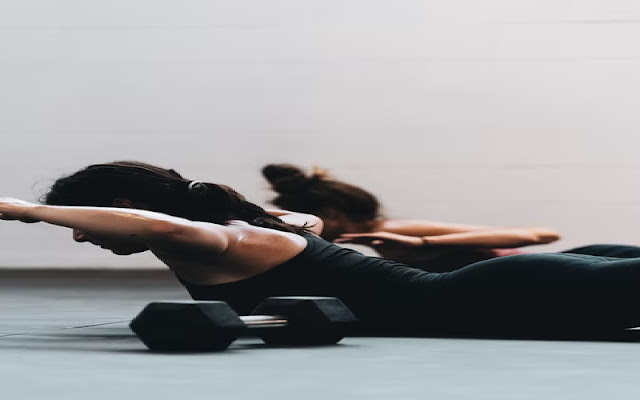Featured
- Get link
- X
- Other Apps
How The Fitness Trackers We Tested Fared
We tested a variety of fitness trackers, from budget-friendly bands to high-end smartwatches. Here's how they fared:
Best Overall: Garmin Vivomove Sport
The Garmin Vivomove Sport is a great all-around fitness
tracker. It's accurate, comfortable to wear, and has a good battery life. It
also has a variety of features, including:
All-day heart rate monitoring
Sleep tracking
Stress monitoring
Built-in GPS
Automatic workout tracking
Smart features like notifications and music controls
Best Budget Fitness Tracker: Amazfit Band 7
The Amazfit Band 7 is a great option for budget-minded
shoppers. It's affordable, but it still provides accurate fitness tracking. It
also has a long battery life and a variety of features, including:
All-day heart rate monitoring
Sleep tracking
Stress monitoring
Blood oxygen saturation monitoring
Over 120 sport modes
Smart features like notifications and weather updates
Best Fitness Tracker for Athletes: Garmin Fenix 7 Pro
The Garmin Fenix 7 Pro is the best fitness tracker for
serious athletes. It has a wide range of features, including:
All-day heart rate monitoring
Sleep tracking
Stress monitoring
Built-in GPS
Advanced workout tracking features
Multisport support
Topographic maps
Smart features like notifications and music controls
Best Fitness Tracker for Women: Fitbit Charge 5
The Fitbit Charge 5 is a great fitness tracker for women.
It has a variety of features that are specifically designed for women,
including:
Menstrual cycle tracking
Pregnancy tracking
Breastfeeding tracking
All-day heart rate monitoring
Sleep tracking
Stress monitoring
Built-in GPS
Smart features like notifications and music controls
Best Fitness Tracker for Kids: Garmin Vivosmart Jr. 5
The Garmin Vivosmart Jr. 5 is a great fitness tracker for
kids. It's durable, fun to wear, and has a variety of features that are
designed to get kids moving, including:
All-day activity tracking
Sleep tracking
Swim tracking
Fun challenges and games
Smart features like notifications and rewards
These are just a few of the many fitness trackers on the
market. When choosing a fitness tracker, it's important to consider your
budget, your needs, and your lifestyle.
How accurate are fitness trackers?
Fitness trackers are generally accurate at tracking basic
metrics like steps, distance, and heart rate. However, they are less accurate
at tracking more complex metrics like calorie burn and sleep quality. The
accuracy of fitness trackers can also vary depending on the brand, model, and
how you are wearing it.
Overall, fitness trackers can be a good tool for motivating
you to move more and tracking your progress over time. However, it's important
to keep in mind that they are not perfect and may not be 100% accurate.
How do fitness trackers measure heart rate?
Fitness trackers measure heart rate using a technology
called photoplethysmography (PPG). PPG uses light to measure the amount of
blood flowing through your veins.
PPG trackers typically have a green LED light and a light
sensor. The green light is absorbed by the blood in your veins, and the light
sensor measures the amount of light that is absorbed. When your heart beats,
more blood flows through your veins, and the light sensor detects a decrease in
the amount of light that is absorbed.
PPG trackers can measure your heart rate at rest or during
exercise. However, they may be less accurate at measuring heart rate during
high-intensity exercise.
Here are some tips for getting the most accurate heart
rate readings from your fitness tracker:
Make sure the tracker is snugly fit around your wrist.
Wear the tracker on the top of your wrist, below the wrist
bone.
Avoid wearing the tracker over tattoos or scars.
Keep the tracker clean and dry.
If you are concerned about the accuracy of your fitness
tracker's heart rate readings, you can compare them to readings from a chest
strap heart rate monitor. Chest strap heart rate monitors are more accurate
than PPG trackers, but they can be less comfortable to wear.
How do fitness trackers know how many calories you burn?
Fitness trackers use a variety of factors to estimate how
many calories you burn, including:
Your heart rate
Your weight
Your height
Your age
Your gender
The type of activity you are doing
Fitness trackers use this information to calculate your
basal metabolic rate (BMR), which is the number of calories you burn at rest.
They then use your activity level to calculate how many calories you burn above
your BMR.
The accuracy of fitness trackers at estimating calorie burn
can vary depending on the brand, model, and how you are wearing it. However,
they can be a good tool for tracking your progress and getting a general idea
of how many calories you are burning.
Here are some tips for getting the most accurate calorie
burn readings from your fitness tracker:
Make sure the tracker is snugly fit around your wrist.
Wear the tracker on the top of your wrist, below the wrist
bone.
Avoid wearing the tracker over tattoos or scars.
Keep the tracker clean and dry.
Enter your accurate weight and height into the tracker
settings.
Select the correct activity type when you are tracking your
workouts.
If you are concerned about the accuracy of your fitness
tracker's calorie burn readings, you can compare them to readings from a chest
strap heart rate monitor. Chest strap heart rate monitors are more accurate
than PPG trackers, but they can be less comfortable to wear.
It is important to note that fitness trackers are not medical
devices and should not be used to diagnose or treat any medical conditions. If
you have any concerns about your health, please consult with a doctor.
- Get link
- X
- Other Apps
Popular Posts
Nutritional and Organoleptic Aspects of Goat milk
- Get link
- X
- Other Apps

Comments
Post a Comment